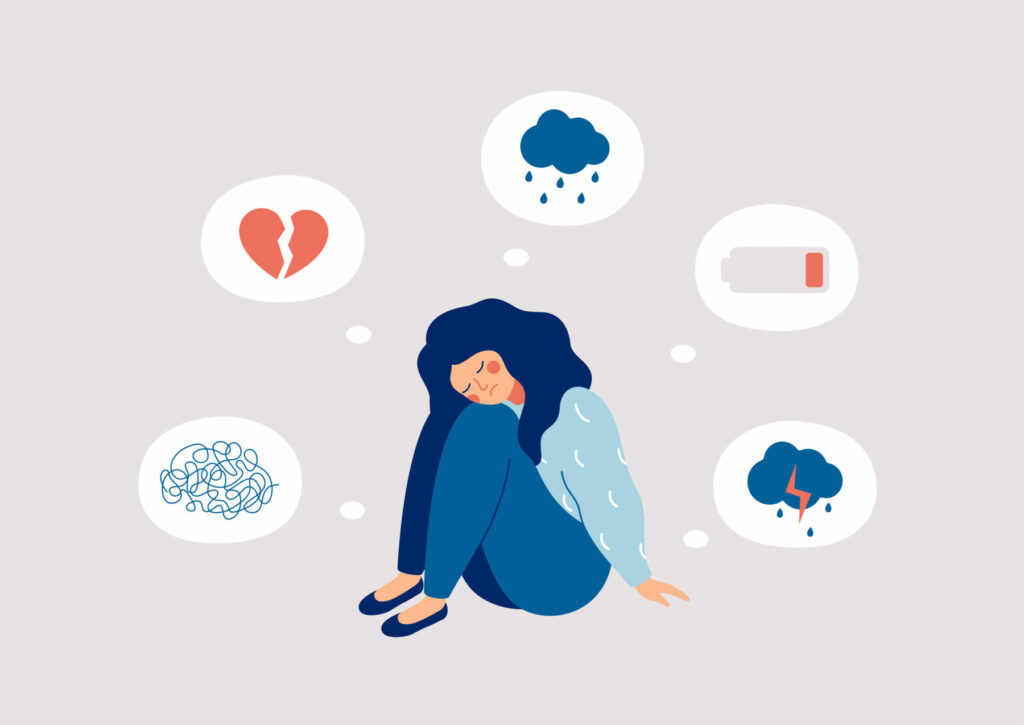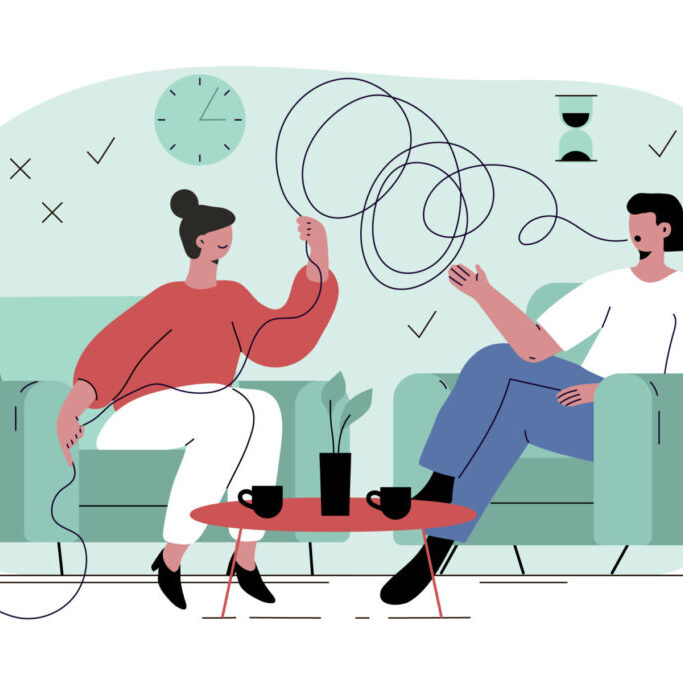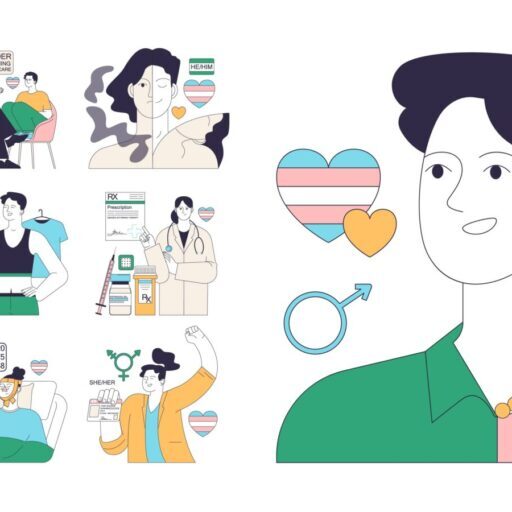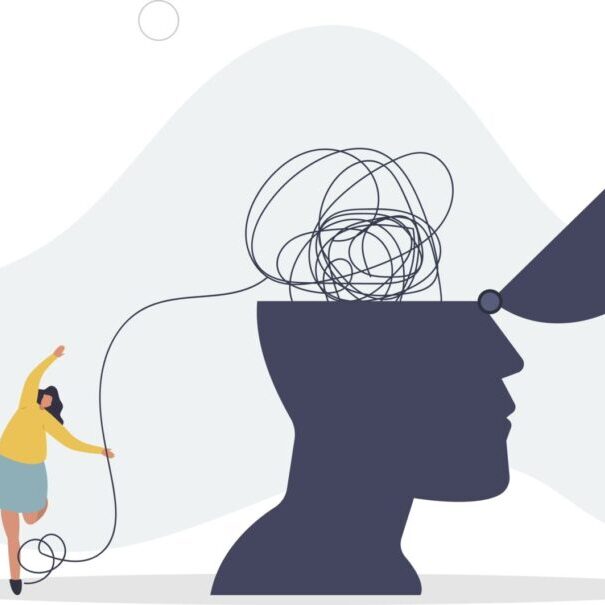Understanding Anxiety and Depression for LGBT People

Depression and anxiety affect various populations, but they are significantly more prevalent within the LGBT community. Studies consistently show that individuals identifying as Lesbian, Gay, Bisexual, or Transgender face higher risks for these mental health challenges. Therefore, understanding the unique factors contributing to depression and anxiety among LGBT people as well as finding therapists who specialize in LGBT care is crucial.
Understanding Depression and Anxiety in LGBT Communities
Doesn’t everyone have depression and anxiety?
Depression and anxiety, although distinct, are often co-occurring disorders that significantly impact the quality of life. Depression is more than just feeling “down” or “sad.” It is a clinical mental health condition characterized by a constellation of symptoms that may include persistent feelings of sadness, hopelessness, loss of interest in activities, and physical symptoms like fatigue and sleep disturbances.
These symptoms typically last for two weeks or more and interfere significantly with daily functioning. It’s crucial to differentiate between clinical depression and transient emotional states; the former often necessitates intervention by a qualified depression therapist to manage effectively.
On the other hand, anxiety presents as persistent, excessive worry and fear about everyday situations. Both conditions can cripple an individual’s ability to function in daily life and may even lead to physical symptoms. Given the severity of these disorders, it’s critical for individuals experiencing symptoms to seek qualified help from therapists skilled in treating depression and anxiety.
Prevalence among LGBT People
Various research findings indicate that depression and anxiety are 2-3 times more likely in LGBT and queer people compared to their non-LGBT counterparts. Such disparities are not merely statistical figures but represent substantial, real-life challenges for queer and LGBT people. The increased prevalence underscores the urgent need for specialized therapy for depression and anxiety, specifically designed to address the unique challenges that LGBT individuals face.
Many factors contribute to elevated rates of depression and anxiety among LGBT people, including:
- Minority Stress – The concept of minority stress (a form of stress experienced by members of a stigmatized minority group) plays a significant role in the elevated rates of depression and anxiety within the LGBT community. This unique form of stress results from systemic inequality and discrimination and often complicates the process of anxiety and depression therapy. For therapists, understanding minority stress is crucial to offering effective therapy for depression and anxiety tailored to LGBT individuals.
- Social Stigma and Discrimination – Beyond minority stress, LGBT individuals often face additional layers of societal prejudice, including social stigmatization and discrimination. These experiences can range from explicit acts of hate and rejection to more subtle, systemic forms of discrimination, such as workplace inequality or healthcare disparities (It seems only appropriate to call out the mental health field for including homosexuality in the DSM until 1973). Discriminatory experiences not only contribute to symptoms of depression and anxiety but can also complicate the therapeutic process, making specialized interventions essential.
- Identity Concealment and Outing – The act of concealing one’s sexual orientation or gender identity can be a significant source of stress, contributing to symptoms of depression and anxiety. On the flip side, being forcibly “outed” or disclosed without consent can be equally traumatic. Both experiences can deepen feelings of isolation and vulnerability, adding yet another layer of complexity that therapists must navigate effectively to treat depression and anxiety in queer and LGBT people.
- Intersectionality – Intersectionality is the concept that various forms of social and identity-related discrimination can intersect, leading to a complex web of stressors that can exacerbate mental health conditions. For instance, an LGBT person who also belongs to a racial minority may face compounded discrimination. Such intersectional identities require a nuanced understanding and specialized approach from anxiety and depression therapists.
Therapy for Depression and Anxiety
In the landscape of mental health treatment, anxiety and depression therapy stands as a cornerstone for alleviating symptoms and improving quality of life. Various approaches to anxiety and depression therapy, each with its unique set of techniques and principles, have proven effective.
However, the effectiveness of these therapies is not universally experienced by all demographics. For queer and LGBT people, who face higher rates of depression and anxiety, understanding the efficacy of different therapeutic approaches is especially critical. This section will delve into the effectiveness of various types of depression therapy, highlighting how they can be tailored to meet the unique needs of LGBT and queer people.
- Cognitive Behavioral Therapy (CBT) – CBT is a form of psychotherapy that has proven highly effective for treating both depression and anxiety. This approach focuses on identifying and challenging distorted thought patterns and promoting healthier behaviors. A 2021 study published in the Journal of Clinical Psychology highlighted the efficacy of CBT in reducing symptoms of depression and anxiety among LGBT individuals, especially when adapted to address minority stress and discrimination.
- Psychodynamic Therapy – Psychodynamic therapy offers another lens through which to explore mental health disorders. This approach focuses on uncovering unconscious thoughts and feelings, facilitating a deeper emotional understanding. While not always the first line of treatment for depression or anxiety, it can be particularly useful for LGBT individuals who have experienced long-term discrimination or trauma, helping them link past experiences to current symptoms.
- Internal Family Systems (IFS) – Internal Family Systems therapy offers a holistic approach to treating complex emotional issues. By helping patients identify and reconcile different “parts” or aspects of themselves, IFS therapy can be particularly beneficial for LGBT individuals. This approach recognizes the complexity of emotions and identity, providing a structured way to explore and integrate these varied facets. Parts that were often exiled in order to manage discrimination and minority stress can be explored, witnessed, and healed.
- Client-Centered Therapy – The core tenet of client-centered therapy is creating a non-judgmental, empathic therapeutic environment. For queer and LGBT people, this form of depression therapy is critical, as they may have experienced significant levels of stigma, discrimination, or misunderstanding. The focus is on empowering the individual, building trust, and thereby making the therapy for depression and anxiety more effective.
- Interpersonal Therapy – Interpersonal therapy aims to address the way relationships and social interactions contribute to mental health conditions. Given that many LGBT individuals face unique interpersonal challenges—ranging from family rejection to social discrimination—this form of therapy can be particularly effective in treating depression and anxiety.
Antidepressant Medication
In addition to therapy for depression and anxiety, medications like antidepressants and anti-anxiety drugs are often prescribed. While these medications can be highly effective, it is essential for healthcare providers to consider potential side effects and medication interactions, especially for transgender individuals who may be undergoing hormone replacement therapy. Notably, medications are also more effective when combined with therapy for depression and anxiety.
Alternative Treatments
Supplements, acupuncture, and other alternative therapies are gaining popularity as supplementary treatments. While some individuals report benefits, it is crucial to note that these alternative therapies generally lack extensive research to support their efficacy in treating depression and anxiety.
Can therapy really help with anxiety and depression?
Absolutely! The effectiveness of therapy for depression and anxiety plays a significant role in the long-term prognosis for LGBT individuals. You don’t have to live with depression or anxiety. When mental health care is tailored to address the unique stressors and experiences of LGBT individuals, anxiety and depression therapy tends to be more effective, leading to improved mental health outcomes and overall quality of life.
The mental health disparities seen in depression and anxiety rates among LGBT individuals require specialized, empathetic approaches for effective treatment. Traditional therapy models may not fully capture the unique stressors and experiences that contribute to mental health conditions for queer and LGBT people. Discrimination, social stigma, and minority stress are just some of the factors that can complicate the therapeutic landscape.
Therefore, therapists and healthcare providers must adapt and expand their treatment protocols to ensure they are culturally competent and sensitive to these unique needs. This involves not only a deep understanding of depression and anxiety but also an integration of strategies specifically designed to address the factors contributing to mental health disparities among queer and LGBT people. With targeted, empathetic, and specialized care, there is a greater likelihood of improving mental health outcomes and overall well-being for LGBT individuals.
This blog is made for informational and educational purposes only. It is not medical advice. The information in this blog is not intended to (1) replace a one-on-one relationship with a qualified licensed health care provider, (2) create or establish a provider-patient relationship, or (3) create a duty for us to follow up with you.



